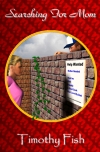
And Thy House
Extra Feature: High Res Image

History of
Cane Creek
Association
by D. F. Magruder
Death of the Book
Written By: Timothy Fish Published: 11/14/2007
Jeff Gomez was recently interviewed by Joe Wikert concerning the concept of Print is Dead. The basic concept is that as technology improves we will see print begin to disappear, replaced by digital content. We have seen this extensively in reference materials. First we saw encyclopedias replaced by CDs on multimedia machines, but as Internet technology improved we saw CDs replaced by websites containing the same information. Rather than pulling a bound dictionary from the bookshelf we might search for a definition on the Internet or in a piece of software loaded on our computers. There is great potential for digital content to replace textbooks and provide information in a way that paper never could.
For reference books, the search capability along with the possibility of using video and interactive forms to illustrate concepts gives digital content a clear advantage over the print version. There are still times that we like to have a hardcopy in our hand, but given a choice between the two, a reader will prefer the digital content.
With novels it is not so clear that digital content is a better choice. One possibility is an eBook. An eBook is essentially an electronic version of the book that requires a special reader or computer. The experience of reading the book is not as good as with the paper format. The text can be converted to an audio file and a person can listen to the book. Some people like this, but it is not a clear improvement over a paper format. Another possibility is that the book can be converted into a movie and the electronic version can be provided, but movies are expensive to make and much less of the story can be included in the movie than can be included in the pages of a book.
The thing we have to ask ourselves is if there is a method of presenting a story as digital content that provides a clear advantage over reading a book from cover to cover and yet is as cheap as or cheaper to produce than a novel. Some of the things we have seen in digital content are not improvements but are ideas that people have developed because they assume that the latest and greatest thing most be better than the tried and true. People are moving forward on the assumption that there must be a digital replacement for the novel and they are hoping that their ideas for what it will look like will be the one that catches on.
If digital novels catch on in some format, the big question will be how the storyteller will be compensated for the effort he has put into it. Currently, much of the digital content that is available is free. It is provided in hopes that the people using it will visit other sites or buy other products or services. I do not believe that a model like that will work well for novels.
There are still many more questions than answers. There will be changes that take place in the future, but even if the printed novel dies I do not think the bond between the novelist and the reader will die.
www.timothyfish.com



